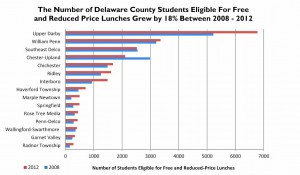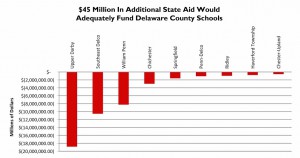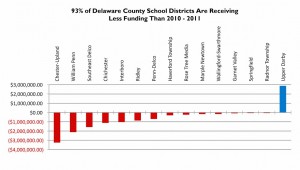Last month we showed the trend of rising share of low-income students in Delaware County and the challenges those students face in Delco’s public schools. Today we’ll take a deeper look at the numbers and see what needs to be addressed and why the state is making matters worse.
The number of students in Delaware County eligible for free and reduced-price lunch jumped 18% between 2008 and 2012. The impact has been felt particularly hard in Upper Darby, where a 30% increase since 2008 has resulted in nearly 6,800 qualifying students—almost 30% of all students eligible for free and reduced-price lunch in Delaware County. Unfortunately, Upper Darby wasn’t the only district in Delco having to deal with a major increase in economically disadvantaged students. In Marple-Newtown, the number of students eligible for free and reduced-price lunch more than doubled and in Springfield, the rate grew by nearly 80%.
What is most important is that resources are made available to help these districts support students with more difficult home lives. While education is often seen as an equalizer to combat the cycle of poverty, many districts in our region are not equipped with the resources necessary to support students from economically disadvantaged families. Data shows that children living in economically-disadvantaged families have greater difficulties meeting the demands of school. One of the best investments towards a lifetime of success is guaranteeing a strong start, such as with full day kindergarten. Regrettably, you won’t find it in the in the three school districts listed coping with major increases in economically-disadvantaged students. With 863 students, Upper Darby has by far the largest kindergarten enrollment, more than twice as much as any other Delaware County district. But Upper Darby does not offer full day kindergarten. Things aren’t much better in Marple-Newtown, where less than 3% of kindergarteners receive full day education, and Springfield doesn’t have any full day kindergarten seats.
Expanding access to early childhood education costs money and thanks to politically motivated school funding decisions in Harrisburg, 93% of Delaware County school districts are currently funded at a level below where they were just three years ago. Only Upper Darby has seen an increase over 2010 levels, but that doesn’t mean it is adequately funded. Not by any means.
PCCY compared current funding levels to where they would be if the state went back to a research based funding formula and found that Delaware County school districts are being shorted more than $45 million this year alone. And Upper Darby is responsible for the largest part of that funding deficit; its funding gap is roughly the size of the next two largest deficits combined.
The problems faced by Delaware County are not unique to Delco, people all over the country are still struggling from the recession and school districts have felt the effects. But the problems are addressable. By reinstituting a fair funding formula in Harrisburg, the state can ensure that Delaware County schools get the funding they need to provide the best possible education for all their students, regardless of their economic situation at home.



